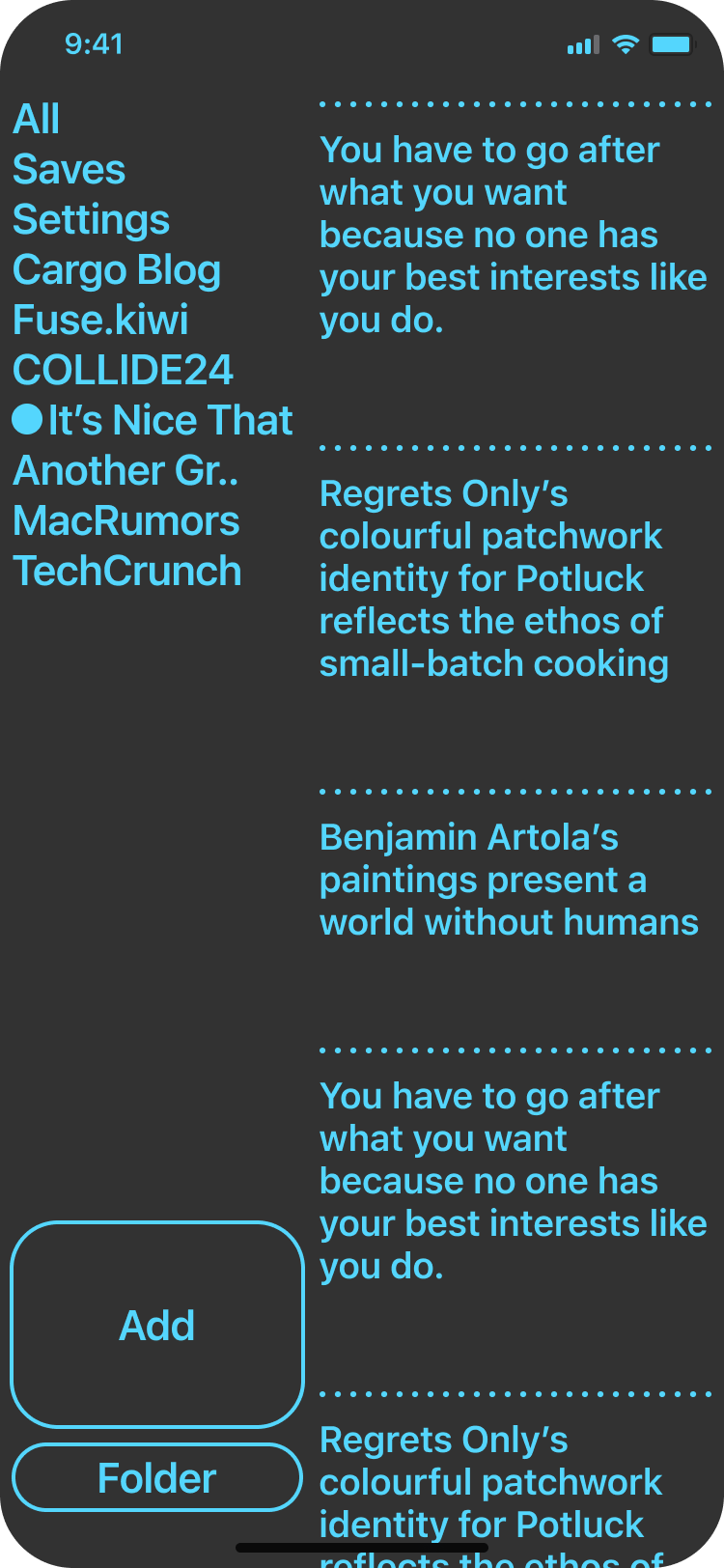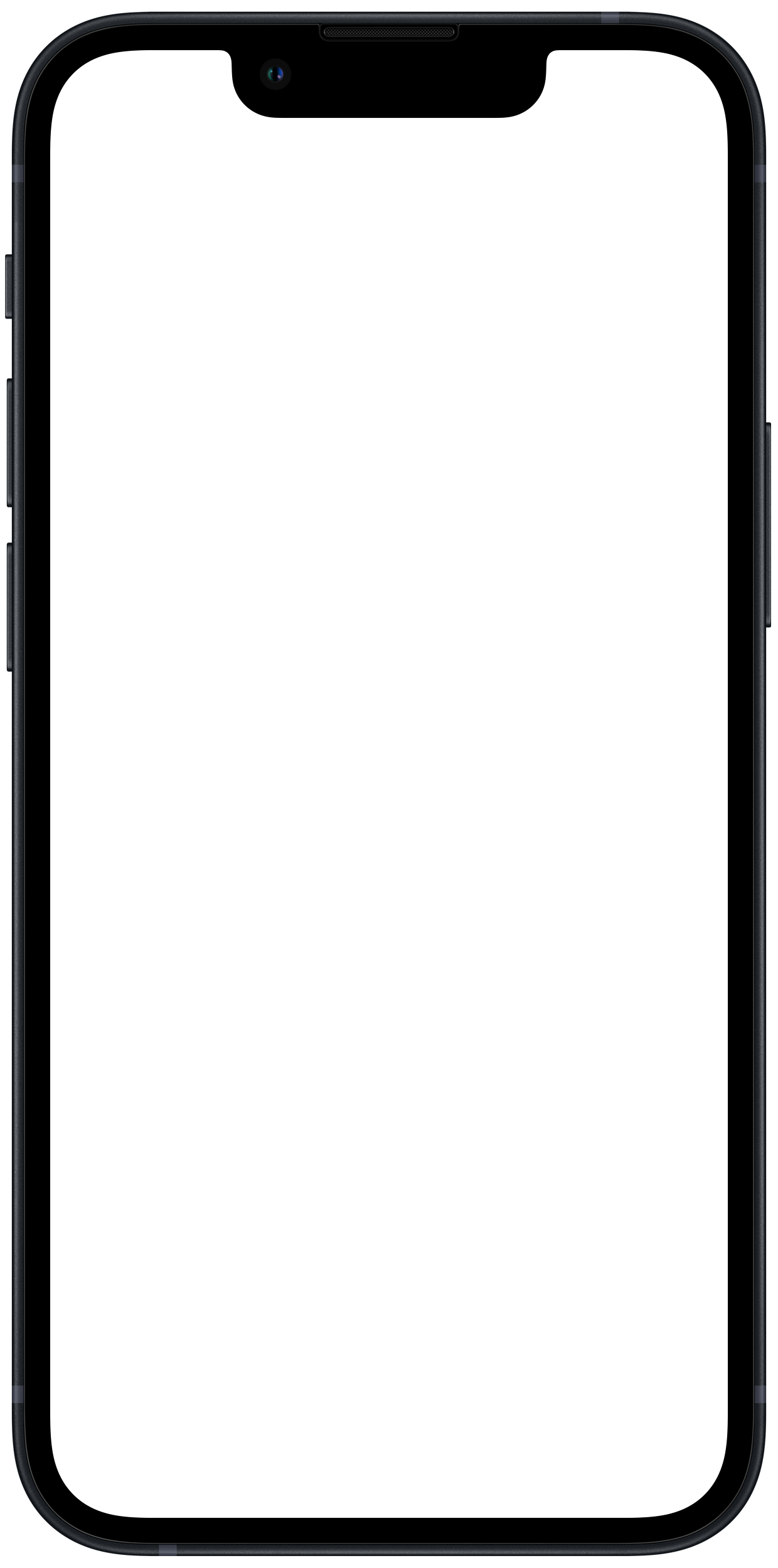Follow the web.
See what's new.
Follow your favorite websites and browse their newest content in one place. Coming for iOS and Android. Get the iOS Beta


Home
Build your feed. Follow sites and browse their content.
New posts are indicated with a number and highlight.
The 'All' tab combines the latest posts from all your feeds.
'Saves' lets you come back to posts you want read later.
Long press a tab for extra options and customization.
Add & Discover
Browse recommended sites to get started with interesting creative content.
Search a URL to find available feeds from that website.
Discover similar sites with webrings and make recommendations
Folders
Use folders to organize feeds by topics or interest.
Easily create folders and manage feeds inside.
Open a folder to see a feed of all the sites inside.
Read
Read a post right in the app. On the site or in reader view.
Save it for later and find it in your Saved section.
Navigate to the next post with the arrows in the bottom bar.
Future
Future versions of Syndicate will open new kinds of sources and allow you to share yourself.
Follow people across platforms like Twitter, Threads, and Mastodon.
Make a post to audiences on other decentralized platforms.
Style
Choose a palette from a color picker or randomize a new combination
Go wild and creative with vibrant colors
Choose colors that reflect your taste.
Or focus with no nonsense colors.
Pick your palette
Randomize Colors
Revival of 2000's
web architecture
How a 25-year-old protocol might help us read, learn, and stay focused on the web.
Information is all around us. Its abundance is in every corner we look. We can find an answer to any question and learn new skills without leaving our beds. As we've learned from previous generations of designers, we are in a constant cycle of ever-increasing information. As the quantity increases, the form needs to adjust with it.
"As a rule we no longer read quietly line by line, but glance quickly over the whole, and only if our interest is awakened do we study it in detail." (The Principles of New Typography, Jan Tschichold, 1928)
Today, we are at a capacity of information that can render us oversaturated. On one hand, we feel we don't need to learn because of a "my phone has a calculator" logic; we question learning something if it's only ever a gesture away. On the other hand, we are drowned in information without our direction, the "suggestion feed."
In a creative pursuit and in finding our taste, we need to read, look, and absorb. Reading may be one of the most important skills of the 21st century. We have the library of Alexandria in our pocket, which has lowered the barrier to entry for learning and developing skills; we simply need the time and focus.
Faucet over firehoseSyndicate attempts to help you regain some control over how you manage and receive information online. You decide what to follow, and sites will peacefully indicate when new posts are available.
Protocol over platformSoftware that survives long-term is built on protocols (an agreed-upon set of rules for formatting and processing data) rather than proprietary platforms, which keep your data guarded and do not play nice with other platforms. As software becomes easier to develop for lower cost and the barrier to entry drops toward zero, what remains in the abundance of interfaces is their commonality in how they format and communicate data. You can choose from an array of interfaces to do a task in a way that suits your preferences.
The web was conceptualized and built with standards and guidelines. When platforms create links and pages that aren't natively part of this web, they risk losing our data, and we become entrapped in walled gardens.
Fortunately, the early web planted a lot of seeds that have been lying dormant and might offer some aid to these two challenges: information protocols and our ability to parse.
Why now?
The platforms we invest our time, attention, and content into aren't
really built with longevity in mind. MySpace, Facebook, and now
Instagram all felt at one time like unshakable towers of security
("how could they fail?"), but within a decade, change and crumble in
surprising ways. These exodus's mean a loss of community, and
content. Why hang out in a 'private park'?
Meanwhile, the 'natural' web remains in good operational health
since its inception (e.g., email). Protocols are a safe and long
term place build on for the future migrations. They offer
flexibility and movement between platforms and give you a choice of
interfaces for the same stream of content.
Most likely there won't be one winner, but more choices for places
to find information, writing, community, and forum. Enjoy exploring!
Long Live the Web: A Call for Continued Open Standards and
Neutrality, Tim Berners-Lee, December 1, 2010
Network Science, Albert-László Barabási, 2016
The Web’s Grain, Frank Chimero, February 18, 2015
New media, old story—the progress of radio, Tom Standage and Seth
Stevenson, Sep 4, 2019
The Principles of New Typography, Jan Tschichold, 1928
Web Science: Studying the Internet to Protect Our Future, Tim
Berners-Lee, October 1, 2008
The End of Software, Chris Paik, May 31, 2024
Protocols, Not Platforms: A Technological Approach to Free
Speech, Mike Masnick, August 21, 2019
A Big Little Idea Called Legibility, Venkatesh Rao, July 26, 2010
The Information, By Adam Gopnik, February 6, 2011
Technology
Really Simple Syndication (RSS) allows you to follow updates to a website in a standard readable format.
Allows you to see when a website posted something new. Preview the new posts and decide if you want to read or save it later.
Atom is a newer alternative to RSS addressing some of its shortcomings by making it more flexible and more strict.
Feeds that use Atom are blended seamlessly with those that use RSS. You shouldn't see a difference.
Webrings are groups of websites that share a common theme and link to each other. In the 2000s a group of sites would agree to each link to each others websites in their respective footers, creating a 'ring' a visitor could explore along.
Discover similar websites to the ones you've added, and make suggestions and connections between sites you think are relevant.
Pocket is a 'read it later' app and browser extension that let's you save articles and webpages. It connects with Kobo eReaders so you can quickly switch from a save to reading on eInk.
You'll be able to connect your Pocket account to automatically sync and send your saved posts from Syndicate.
ActivityPub is the leading standard for decentralized social media. It let's social media apps work together so your posts and followers can use any app and vice versa.
Follow people and post a blurb.
Syndicate is built with generic distributed technologies. You are never locked in to one source.
Publishers update an Atom or RSS feed that can be read by any reader app. Increasing their audience and distribution through feed updates, instead of relying on users visting their site directly. Publishers own their content and audience through their website, instead of solely investing in a platform.
Support publishers and writers directly. Advertising revenue goes directly back to the writers and publishers of the content instead of passing through a 3rd party platforms. Plus you can switch readers and get the same content.
With ActivityPub (Google: Federated Social Media), users can post
from one platform, and their audience can read on any platform.
Users can move their data between platforms. Posts and activity
and shared. This freedom of choice doesn't lock you into one
platform because of the fear of losing your audience.
Federated social media: Threads by Instagram (US), Mastodon.
Are you a developer? Syndicate is open source (GNU GPLv3). Contribute to Syndicate on Github.
Contact
contact@syndicate-rss.com